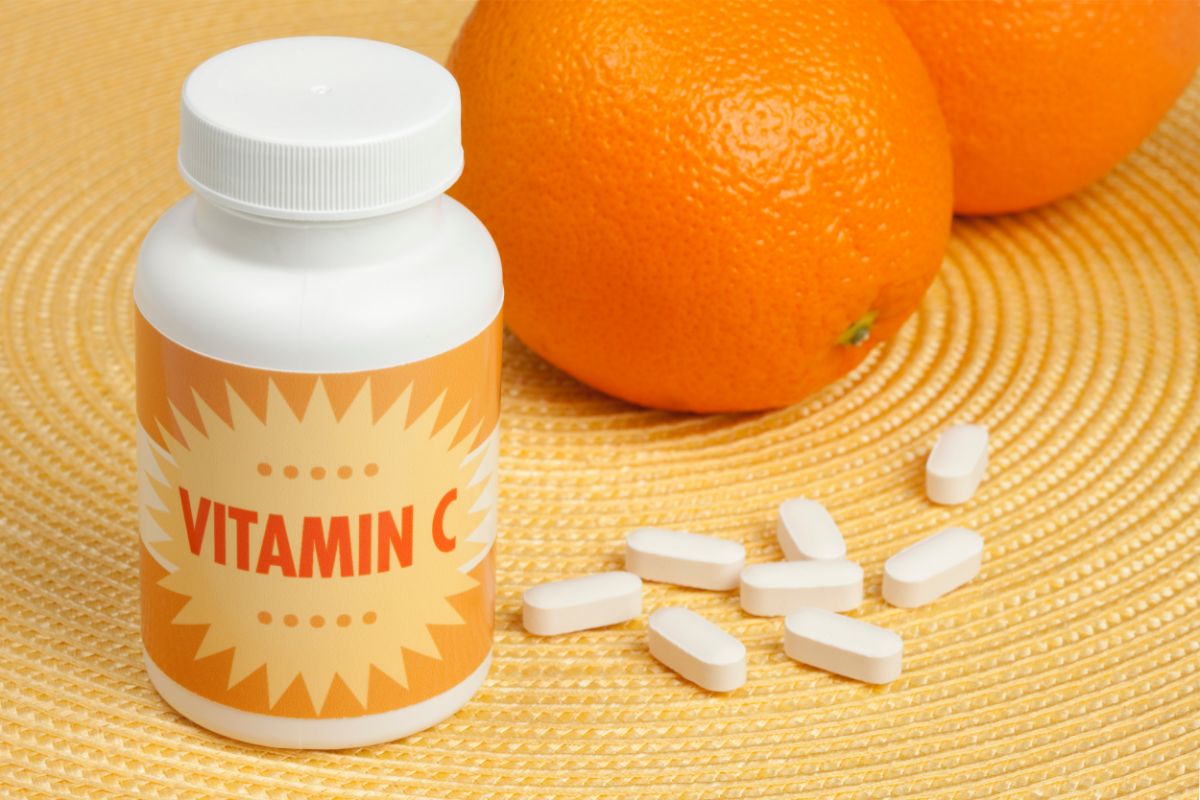Eczema and other skin conditions such as acne can cause extreme discomfort. With the constant itch of the skin, it can quickly become problematic.
You never know where the next flare-up will be and continuous scratching may lead to more severe skin issues.
With more than 31 million people in the US being affected by Eczema (see also ‘Why You Shouldn’t Ignore Your Eczema?‘), you would think there would be a cure…right? Well, no.
This is leading many people to start trying out home remedies, topical creams, and other medications to give their skin a moment of peace.

This method of trial and error has generated both clinical and natural results resulting in a range of results. It’s difficult to keep track!
One remedy which is begging for testing is whether a boost in Vitamin C would aid in calming the constant itchiness of eczema (see also ‘Moisturizing To Reduce Eczema’).
Vital for the human body’s healing process, many are questioning whether the nutrient can assist in alleviating the daily pain of eczema (see also ‘10 Best Eczema Creams For Flare-Ups‘).
So, should you go out and scour the earth for oranges and Vitamin C supplements? This article will explain everything you need to know about eczema and whether the intake of vitamin c is worth the investment. Taking out any experiments on your part!
What is Eczema?
Before we can begin deciding the best course of action to take for this skin condition, we need to know what is. With so many suffering from Eczema, it is commonly known for causing dry patches, itchy skin, and rashes.
There is a range of variations of the condition but the most common is Atopic Dermatitis.
Eczema is an inflammatory skin condition that can cause itchiness, dry skin, scaly patches, and other issues.
With excessive scratching of the skin, the skin protective barrier can be broken causing infections, blisters, and overall discomfort. Bottom line: try not to scratch.
Many experience eczema ‘flare-ups’ where the skin becomes dry, itchy, and flaky for a period of time before calming down to its normal state. Whereas, others are in a constant state of discomfort.
You might be wondering why you suddenly have a form of eczema (see also ‘10 Best Eczema Shampoos For Sensitive Scalps‘)? And there is no definitive answer.
Affecting all ages, genders and ethnicities there is no specific cause for the condition. From newborns to people in their 80s, Eczema can appear with no internal factor at play.
What causes eczema?
However, it has been documented that external factors may play a role in the development of the skin condition.
It’s important to keep in mind that whilst the condition may form on the skin, it can just as quickly disappear.
There are a number of reasons as to why eczema has developed including the change of many household items. Many ordinary household products might behave as environmental irritants, causing allergic responses and eczema flare-ups such as:
- Shampoo, Body Wash, or bubble bath
- Surface cleaners and disinfectants
- Laundry detergent and fabric softeners
- Fragrances in candles or perfumes
If you haven’t made any changes to your hygiene products or fragrances some other factors may be:
- Stress. Having a severe increase in stress can cause the development of eczema. Particularly when the stress impacts your diet. Stress and anxiety can trigger eczema and heighten the discomfort of flare-ups which in turn causes more anxiety and stress.
- Alternatively, a person’s eczema could be developed through their family genetics. It has been proven that if a family member has had eczema, a person is more likely to have it at some point in their life. It could also be related to common allergies identified in a family.
What is Vitamin C?

To be fully technical, Vitamin C is a water-soluble vitamin that can be found in citrus fruits and vegetables. It is a vital nutrient in the repairing of tissue and the building of collagen.
Basically, it’s an important vitamin we need in order to heal any wounds or damages caused throughout our body.
Whilst it is a vitamin that dissolves in water to then be absorbed, our body generally struggles to store the nutrient to gain from its benefits.
Therefore, it’s important not to overdose on Vitamin C.
Vitamin C is often used in helping to beat the common cold and sometimes the flu through the consumption of lemon drinks.
Or, taking vitamin c supplements daily will boost your immune system, preventing bacterial infections such as the common cold.
What is the right amount of Vitamin C?
Adding extra citrus fruits, berries, or vitamin c supplements to your diet will boost your immune system causing you to be more energized, less exposed to bacterial infections such as the common cold, and overall feel brighter. Sounds nice, doesn’t it?
But taking too much vitamin c can lead to some severe consequences. So what is the right amount?
- RDA: The Recommended Dietary Allowance (RDA) for males and women aged 19 and above is 90 mg per day for men and 75 mg per day for women. The dose increases to 85 mg and 120 mg daily during pregnancy and lactation, respectively. Because smoking decreases vitamin C levels in the body, smokers should take an extra 35 mg over the RDA.
- The Tolerable Upper Intake Level (UL) is the highest daily intake that is unlikely to affect one’s health. Vitamin C has a daily UL of 2000 mg; exceeding this dose can cause gastrointestinal upset and diarrhea. Higher than the UL doses are only used in certain circumstances, such as under medical supervision.
Can Vitamin C Help Eczema?
So, should you go out and get all the lemons, oranges, and supplements your money can buy?
No. Whilst increasing your vitamin c intake will show health benefits, there is a recommended daily dose. Overdosing on vitamin c shows no benefits to the body in aiding eczema or any other conditions.
In terms of using vitamin c to aid in eczema, taking the correct daily dosage can be beneficial.
As vitamin c promotes wound healing, the nutrient will help treat inflamed eczema areas.
Vitamin C is required for collagen formation, and its demand typically rises during the healing process.
Vitamin C insufficiency has been linked to poor wound healing in certain studies, and supplementing with vitamin C in those with a shortage may be useful.
While it is important to get a medical expert’s opinion, Vitamin C will help boost your body’s immune system and aid in healing the infected areas caused by eczema.
- Understanding Male Reproductive Health: A Complete Guide - February 2, 2025
- Simple Healthy Skin Habits for Radiant Skin - December 6, 2024
- Unlocking the Connection Between Nutrition and Mental Health - December 3, 2024








